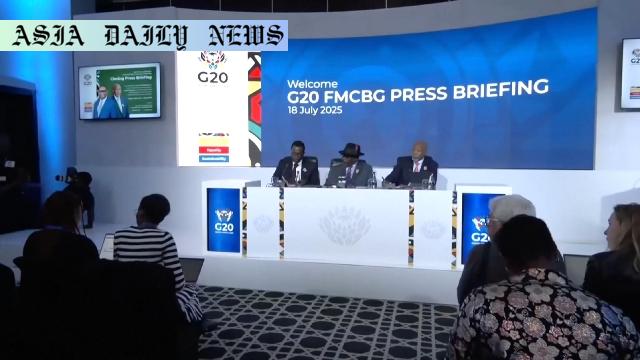Tariffs – The G20 warned rising economic uncertainty due to trade policies and highlighted the need for a united global approach.

The G20’s Concerns over Tariffs and Economic Challenges
The finance ministers and central bank chiefs of the G20 nations convened in South Africa, marking a critical juncture in discussions about the world’s economic stability. The focus of their dialogue revolved around growing trade tensions and the disruptions they pose to global supply chains, investment, and economic interdependence. These discussions come at a precarious time, with the United States under President Donald Trump imposing sweeping tariffs that affect a multitude of nations. However, the communique issued at the end of the meeting notably omitted direct criticism of the U.S. policy or the term “protectionism,” reflecting the complexity of unanimous decision-making in this multinational forum.
In contrast to prior meetings, where resisting protectionism received notable emphasis, the latest statement focused instead on broader risks to global stability. Japanese Finance Minister Kato Katsunobu highlighted the importance of unity within the G20, acknowledging the collective effort needed to address such immediate and long-term economic disruptions cohesively. By sidestepping direct rebuke and framing the issue within a broader call to action, the attendees seemed intent on fostering cooperation and dialogue rather than exacerbating existing disagreements.
The Role of Global Supply Chains and Trade Policies
Observers have noted that the new tariffs threaten to inject significant confusion into global supply chains, which are highly interconnected and rely heavily on predictable and cooperative international trade policies. Countries affected by these protectionist measures face uncertain futures as businesses grapple with higher costs, disrupted trade flows, and eroded consumer trust. Without decisive coordinated action at the international level, the cascading effects are likely to extend into multiple sectors, pushing emerging economies and even developed ones into challenging positions.
The debate over tariffs has reanimated a longstanding question: can globalized economies thrive in an environment where isolationism and protectionism take precedence? The answer hinges not only on diplomatic efforts to mitigate immediate harms but also on the willingness of governments to redesign trade mechanisms, balance national interests, and strengthen global institutions like the World Trade Organization (WTO), whose role in adjudicating disputes remains critical.
Opportunities for Multinational Cooperation
While the challenges discussed at the G20 meeting are daunting, they also provide a pivotal opportunity for nations to reaffirm their commitment to coordinated efforts. One of the most repeated themes in the recent communique is the need for mutual understanding and proactive problem-solving. Initiatives to reinforce trade frameworks, create new partnerships, and invest in shared economic growth strategies remain essential pathways to mitigating existing issues.
By addressing the root causes of economic instability, including gaps in policy alignment and the erosion of trust in global institutions, the G20 has the potential to lead transformative change. The actions nations take in the near term, including the revision of tariff policies and the bolstering of free trade agreements, will likely set the tone for global economic relations for the next decade. Moreover, it will fall on central banks, finance ministers, and heads of state to manage not only their economic policies but also the expectations of an increasingly interconnected global populace.
Commentary
The Growing Impact of Tariffs on the Global Economy
The G20’s recent focus on economic uncertainty and trade tensions underscores the critical challenges facing the global economy. Tariffs, once considered a tool for domestic economic protection, now act as a double-edged sword, cutting through global supply chains and creating widespread disruptions. The strategic absence of the term “protectionism” in the G20 communique reflects ongoing efforts to find consensus in an increasingly polarized world. However, one might ask: is this enough to address the pressing risks?
It is clear that tariffs not only increase the cost of goods but also challenge the core principles of globalization. By raising barriers between nations, they risk reversing decades of progress in building interconnected economies. As countries like the U.S. adopt protectionist measures, the ripple effects extend far beyond their own borders. Emerging markets, which are heavily dependent on export-driven growth, find themselves particularly vulnerable to these policy shifts. These nations often lack the resources to counteract sudden economic shocks, making them susceptible to long-term instability.
A Call for Leadership and Cooperation
The G20 meeting in South Africa serves as both a warning and a call to action. It challenges world leaders to decide whether they will embrace cooperation or allow economic uncertainty to fester. In this moment, nations have the chance to demonstrate that global problems require global solutions. Institutions like the G20 and WTO are more vital than ever, providing platforms for dialogue that are essential for resolving complex international disputes.
Ultimately, the role of the G20 extends beyond just issuing communiques. It must be a space where actionable steps are taken to prevent crises, foster economic resilience, and set the stage for innovation and prosperity in a rapidly changing world. Only through mutual accountability, open dialogue, and visionary leadership can the uncertainties of today transform into the economic opportunities of tomorrow.


